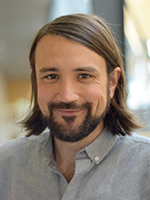Either if you are a bachelor’s level student in health management, a master’s level student in nutrition, a student in the professional study programme in medicine or one of our six master’s programmes in healthcare, we would like you to share your experiences with the way teaching was done during the spring of 2020.
The faculty wants to identify the digital teaching ideas that functioned so well that they can be further developed and/or incorporated in the teaching that is offered under normal circumstances.
- The study is designed by SMI (Student Organization for Medical Innovation) in collaboration with the Faculty of Medicine, and is therefore specially designed to reveal the needs of students.
- When you answer the questions, we would like you think specifically about the period from 12th of March and up until now.
- The survey was sent by e-mail on 16th of June to all students at MED.
- Response deadline 3rd of July
- The study is an anonymised survey, and privacy requirements are provided for in terms of the collection and processing of data.
Why is it important to respond to this survey?
– We believe that our teaching has the potential to be even better than it is today. The corona crisis offered a unique chance to scrutinise and compare the traditional type of teaching we have had against digital alternatives, Filtvedt goes on to say.
– This is what we wanted to do, and in cooperation with the faculty, we have prepared this questionnaire, which we hope will provide us with a good basis for comparison, she says.
– I think it is essential to bring in as many different perspectives as possible, says Stefan Schauber, associate professor at the Norwegian Health Science Education Centre (HUS).
– Particularly in teaching, which concerns the students themselves, it is necessary to include this group in the project, says Schauber. He has worked with psychometric research to contribute towards better education and learning since 2009.
Respond by 3rd of July
– We hope this survey can reveal what we are able to learn from the last few weeks.
We want to know if there is anything that we should continue doing, that we can keep just as it was.

Or, there may be some things that just need a little extra support to make them work perfectly.
Or, we may come to the realisation that online teaching is too demanding for many people, Schauber says.
SMI also hopes to ascertain what aspects of digital teaching worked better or not as well, when compared to traditional teaching.
– Moreover, we hope that this might reveal what needs to be done to improve digital teaching, Filtvedt says.
Schauber thinks that the most important thing is actually that this gives students an opportunity to be heard.
– These are very specific questions about what was good and what was a problem.

The deans of studies, Elin Olaug Rosvold and Eivind Engebretsen, want to know more about what the students think and how their perceptions might become a basis for making changes in the study programmes in the future, he says.
– So this is actually a little more basic democracy at work than it is research’. And I think that this is the difference between the present survey and the central survey about your academic life as a student that UiO sent out a little earlier this spring, Schauber concludes.
